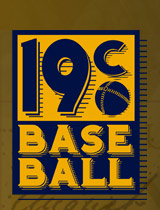1867 Washington Nationals Tour
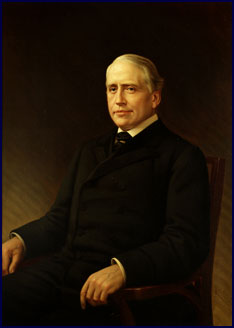
By Eric Miklich

he Nationals of Washington were formed in 1859 and were comprised mostly of government employees. Their home games were played across from the White House on a field called the President's Grounds. In late August of 1865, the Nationals and the Athletic Club of Philadelphia organized a tournament in Washington. The Atlantic Club of Brooklyn also took part in the event and beat the Nationals 33–19 after the Athletics manhandled the Nationals 87–12. The Atlantics and Athletics never had a chance to play each other as the Athletics had another commitment to play the Pastimes in Baltimore, but a second event was arranged for October of 1865. Once again the National and Athletic organized the event but the Atlantics did not attend. Instead the Excelsior Club of Brooklyn made the trip. The Nationals were furious that the Atlantics did not come and claimed that they wasted thousands of dollars in anticipation of their visit. The Atlantics decided primarily not to go because the grounds that were used for the event were not enclosed and the only admission that was charged was for the spectators who sat in the raised platform section generally reserved for ladies. Anyone who stood outside the roped area surrounding the field saw the games for free. The Atlantics had enclosed their home field, Capitoline Grounds and were used to receiving large "gate receipts," and may have also been annoyed that they did not have the chance to play the Athletics in August.
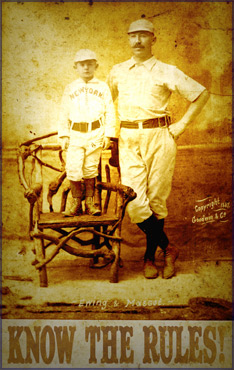
In 1865, Arthur Pue Gorman, who was 26-years old and an outfielder on the Nationals, was the Nationals President. Gorman had greater aspirations toward politics than baseball and had become a friend of Andrew Johnson the previous year. According to When Johnny Came Sliding Home by William J. Ryczek, Gorman arranged for the champions of the August tournament to meet with President Johnson. This is the first account of a United States President becoming involved in the game of baseball.
The Nationals arranged a tour in 1866 and first played in Philadelphia on July 2nd. The largest crowd in the seven-year history of Philadelphia, an estimated 12,000, gathered at 15th and Columbia Streets to see the Athletics beat the Nationals 22-6. On July 3rd the Nationals beat the Keystones of Philadelphia at their field, 11th and Wharton, 26-9. Although Washington was the capital of the Union, they were considered a southern club in "New York" baseball terms. Ironically the Union Club of Washington was denied matches against clubs from Virginia because they were considered "Northern Clubs." The Nationals traveled north to New York and played and lost to the Unions 22-8, on July 4th. The Excelsior Club of Brooklyn beat the Nationals 46-33 on July 5th at Capitoline Grounds. On July 6th they lost to the Gotham Club of New York but beat the Liberty Club in New Brunswick, New Jersey on their way back to Washington.
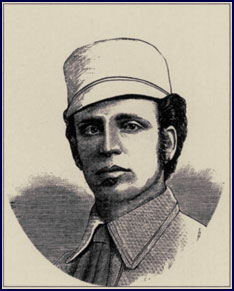
In September the Excelsior Club traveled to Washington and beat the Nationals 33-28 in a game that was witnessed for a short time by Presdient Andrew Johnson. In October of 1866, the Nationals toured Virginia and were allowed matches against "southern clubs" and were received fairly.
Along with their new President, former Union officer Colonel Frank Jones, the Nationals had assembled a strong club in 1867 prior to their monumental tour. The starting “nine” consisted of pitchers Will Williams, considered by many as one of the swiftest pitchers in the country and also a member of the Nationals since 1861 and Asa Brainard, later of the famed Cincinnati Red Stockings. Harry Berthong did the catching. The infield was manned by first baseman Ed Parker, second base was occupied by George Wright (who was also the best player not only on the Nationals, but at the time perhaps in the country), third base was played by George Fox, a former member of the Eckford Club of Brooklyn and the shortstop was Frank Norton. The outfield consisted of leftfielder George Fletcher formerly of Excelsior Club of Brooklyn, centerfielder Andrew Gibney and the right fielder was Sy Studley. The team traveled with two substitutes who were Ed Smith, the shortstop on the 1865 club and a Mr. Hodges also on the 1865 Club. All the players had government jobs and the new president for the 1867 season was Co. Frank Jones, who worked for the Treasury Department. Jones was a former member of the Excelsiors.
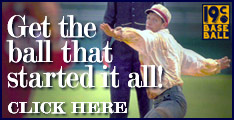
The National Club left Washington on July 11th by train and was comprised of the starting nine, eight reserves from the second nine and nine additional club members. Henry Chadwick also accompanied the club and reported the monumental journey. They arrived in Columbus, Ohio on the 12th. The Nationals and the Capitals played the next day starting a little after 10:00 AM. The score was 7-4 after one and a half innings, but the Nationals scored 14 runs in the bottom of the second and later scored 18 runs in the bottom of the seventh and won the seven inning game easily 90–10.

The next day the Nationals took on Harry Wright's Cincinnati Red Stockings at Cincinnati's Union Grounds. The game was 6-6 going into the fourth inning but the Nationals pulled away and achieved a 53–10 victory. This would be the Red stockings only loss of the 1867 season.
Against the Louisville Club the Nationals won 82-21 and then beat the Indianapolis Club 106-21, with George Wright hitting five homeruns in the contest.
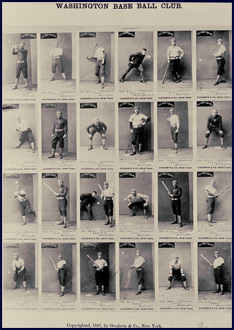
On July 21st, in 104-degree heat, the Nationals played the Union Club of St. Louis and won 113-26, scoring 28 runs in the second inning. The next day the Nationals beat the Unions rival club 53-26, in a six inning game.
The next opponent for the Nationals was to be the Forest City Base Ball Club from Rockford, Illinois. The Forest City Club had traveled about 100 miles to play host to the Nationals and featured 17-year-old pitcher Albert Spalding and Ross Barnes. The game was played at Dexter Park in Chicago and featured two 15 minute rain delays, in the sixth inning and in the ninth inning. The Forest Cities refused to play after the rain delay in the sixth hoping the score would revert to the previous inning when they were ahead 16–11. The Umpire Mr. Dietrick, of the Bloomington Club, informed the Forest Cities that they if they did not continue the game would be forfeited to the Nationals. They returned and eventually won 29-23. The time of the game was two and one half hours.
The Nationals loss to a less experienced club gave the other two Chicago clubs that were to play the Nationals a boost of confidence. On July 27th, about 8,000 spectators turned out to watch the powerful Excelsior Club of Chicago play the Nationals. The Nationals had regrouped and took a 33–0 lead in the third inning and finished with a 49-9 win. The Excelsior Club was in shock as was all of Chicago. Two days later the Nationals destroyed the Atlantics of Chicago 78–17.
The 1867 tour was a huge success, helped strengthen baseball's popularity and showed the mid-west the east coast style of play.
Washington Nationals 1867 Tour
| Date | Result | Score | Location, Field and Opponent | Record |
| 7/13 | Win | 90–10 | at Columbus, OH; Capital Club of Columbus (7 innings) | 1–0 |
| 7/14 | Win | 53–10 | at Cincinnati, OH; Union Grounds – Cincinnati Club (Red Stockings) | 2–0 |
| 7/15 | Win | 88–12 | at Cincinnati, OH; Cincinnati Buckeyes (6 Innings) | 3–0 |
| 7/17 | Win | 82–21 | at Louisville, KY; | 4–0 |
| 7/19 | Win | 106–21 | at Indianapolis, IN; | 5–0 |
| 7/21 | Win | 113–26 | at St. Louis; Union Grounds – Union Club of St. Louis | 6–0 |
| 7/22 | Win | 53–26 | at St. Louis; Empire (6 Innings) | 7–0 |
| 7/25 | Loss | 23–29 | at Chicago, IL; Dexter Park – Forest City BBC of Rockford | 7–1 |
| 7/27 | Win | 49–9 | at Chicago; Chicago Excelsiors | 8–1 |
| 7/29 | Win | 78–17 | at Chicago; Chicago Atlantics | 9–1 |
More Teams & Tours
1867–1870 Cincinnati Club; aka “Red Stockings” Tour ![]()

